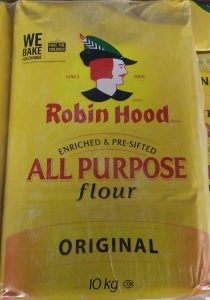E.coli O121 has sickened 26 people that has now been linked to Robin Hood All Purpose Flour, Original, in Canada.
 Health types advise Canadians not to use or eat any Robin Hood All Purpose Flour, Original sold in 10 kilogram bags with a code containing BB/MA 2018 AL 17 and 6 291 548 as these products may be contaminated with E. coli. For additional recall details, please consult CFIA’s recall notice. Restaurants and retailers are also advised not to sell or serve the recalled product, or any items that may have been prepared or produced using the recalled product.
Health types advise Canadians not to use or eat any Robin Hood All Purpose Flour, Original sold in 10 kilogram bags with a code containing BB/MA 2018 AL 17 and 6 291 548 as these products may be contaminated with E. coli. For additional recall details, please consult CFIA’s recall notice. Restaurants and retailers are also advised not to sell or serve the recalled product, or any items that may have been prepared or produced using the recalled product.
This outbreak is a reminder that it is not safe to taste or eat raw dough or batter, regardless of the type of flour used as raw flour can be contaminated with harmful bacteria such as E. coli.
But what do the health types really know?
Free from the shackles of government PRery, someone from Health Canada told ProMed a few days ago, a sample of Robin Hood flour was collected from one case’s home. The sample tested positive for E. coli O121 and had matching PFGE to the clinical cases. Subsequently, a sample of Robin Hood flour collected from a retail location also tested positive for E. coli O121. Several cases reported contact with Robin Hood flour.
Isolates from the 2016 U.S. outbreak have been compared to the current outbreak in Canada by whole genome sequencing (via PulseNet International); the Canadian outbreak strain is not similar to the U.S. outbreak. Comparisons will continue to be made on an ongoing basis throughout the outbreak investigation in Canada.
Profs. Keith Warriner and Jeff Farber of the University of Guelph told CBC uncooked flour, such as that found in raw cookie dough, can host E. coli bacteria, and we may need to handle flour in the same way that we handle uncooked meat.
